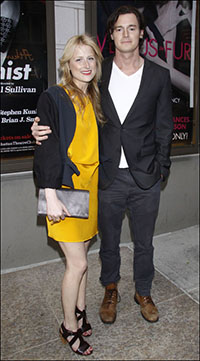
*
He's played presidents in the popcorn flick "Abraham Lincoln: Vampire Hunter" and the Broadway rock musical Bloody Bloody Andrew Jackson, but Benjamin Walker now faces one of his greatest challenges in leading a classic Tennessee Williams family drama. Walker, whose previous Broadway credits include revivals of Inherit the Wind and Les Liaisons Dangereuses, stars as tormented alcoholic Brick Pollitt opposite Tony winner Scarlett Johansson's Maggie in the latest revival of Cat on a Hot Tin Roof, which officially opens Jan. 17, 2013, at Broadway's Richard Rodgers Theatre. The 30-year-old actor-comedian discusses the perils of onstage drinking and how he's found the funny in the dysfunction.
You became an action star in "Abraham Lincoln: Vampire Hunter," and you'll next appear onscreen in the HBO film "Muhammad Ali's Greatest Fight." As you branch out into TV and film, how important is it for you to stay connected to the theatre?
Benjamin Walker: I started out in the theatre, and I'm never going to not be doing theatre. I love that the best literature is in the theatre, and I love the people in the theatre. I love that the theatre community is a real community, whereas the movie business is a business. I like working in that business too, and I'm inspired by people in that field, but it's the legacy of the theatre that keeps drawing me to it.
You showed tremendous loyalty to the theatre when you turned down the role of the Beast in the film "X-Men: First Class" in order to transfer with Bloody Bloody Andrew Jackson from the Public Theater to Broadway.
BW: That was a complicated decision, but it boiled down to the fact that I was going to regret not being a part of that show on Broadway. When you're lying there dying, those are the things you think about, and I didn't want that particular regret. I try to keep my regrets counted on one hand.
Realistically, that production may not have moved to Broadway without your involvement.
BW: And those are my friends, man. We'd all grown with the show for so long. I was broke anyway, so I figured I could be broke a while longer. No big deal. Unfortunately, Bloody Bloody Andrew Jackson closed on Broadway after only 120 performances. Any regrets there?
BW: Absolutely not. We took that show as far as it could possibly go. For that, I could not be more proud of the cast and everyone involved. I had dinner with [composer-lyricist] Michael Friedman a few weeks ago, and he was saying that Andrew Jackson is one of the top 10 most produced shows across the country. There are, like, four productions in Texas alone. That's remarkable. That's where the show should live and probably will for a long time.
 |
||
| Walker in Bloody Bloody Andrew Jackson. |
||
| Photo by Joan Marcus |
BW: Our director, Rob Ashford, was one of the first guys to give me a shot. We were going to do Brigadoon together a few years ago, but it fell apart. We've since worked together on a number of things, like opening the Smith Center for the Performing Arts in Las Vegas. I adore his work. He inspires me, and I knew that I could learn a lot from him. And Scarlett's not bad either! Based on those two components alone, I'd be interested in doing the play even if it were toilet paper. Rob Ashford is an inspired choice for this revival, which marks his directorial debut of a non-musical Broadway production. He's a director-choreographer best known for his work on shows like Evita, How to Succeed and Thoroughly Modern Millie.
BW: Well, the play's very musical. It is music. It is poetry. It is dance. A trap of the play is to let the movement be worn down slow by the Southern heat, but these people really are like a cat on a hot tin roof — screaming, bouncing, constantly jumping in pain. The need for that physicality is something Rob really understands and is brilliant at pulling out of us.
One sometimes wonders why a particular play gets revived time and time again.
BW: Oh, yeah. It's like, "Leave it alone! They got it right last time."
What is it about Cat on a Hot Tin Roof that people continually want to revisit?
BW: It's about something that's truly timeless and that, because of the human condition, we will struggle with until we're extinct: The need to communicate and our inability to do so. It's also about the need to express love and feel love and how difficult that is. It's about the complexities of sexuality and how that's perceived. And it's about the idea of legacy and the future. A lot of plays only exist in a certain time, and when you watch them you're looking back on that time as if you're going to the Museum of Natural History. But when you read this play, the play's written so well that the poetry of the writing illuminates something about your own time. It's not a pageant of another era. It sheds a new light on your own issues with love and family.
What do you think separates this revival of Cat on a Hot Tin Roof from others before it?
BW: We're certainly bringing a sexuality and a vitality to the play in a way that I don't think has been done before. We're approaching it in a way that there's real potential for calamity. It's going to be a mess in the way that real life is. These people say what they mean and mean what they say with all their heart, so it's very passionate in the Shakespearean sense. There's nothing casual or lackadaisically Southern about it. These people could pop at any second. But I don't really find it productive to compare productions. I find that dangerous. It's been a long time since I've seen the 1958 movie, and I didn't see the Ashley Judd version on Broadway in 2003, so I don't really know what's different about our production. You'll have to tell me after you've seen it.
Did you not see the 2008 African-American revival with Terrence Howard either?
BW: No, I didn't. I wish I had seen that.
 |
||
| Scarlett Johansson and Benjamin Walker |
||
| photo by Joseph Marzullo/WENN |
BW: There are definitely some traps for Brick, particularly in the early few pages of the play when he doesn't say very much and he's drinking a lot. So much of his life is about trying to avoid issues, avoid feelings, avoid memories. That can be a trap for an actor, because you're not engaged with anyone, so it comes off as blasé, one-note and boring. It's like watching a boiling pot: You don't know what's going on inside if there's a lid on it, but if you know that it's boiling, you know it can blow at any second. Visually, both pots are almost the same, so you have to have that internal turmoil. Much of your audience will likely be familiar with Cat on a Hot Tin Roof from the film or from recent revivals. The great Paul Newman famously played Brick onscreen. Do audience preconceptions put any additional pressure on you?
BW: Nah. Screw 'em. [Laughs.] I don't understand how that's helpful to anybody. Those expectations certainly aren't helpful for the audience. If you're expecting something, looking forward to something, you're going to miss something. It seems detrimental to your experience, and it's also detrimental to our work. But I don't think as many people do that as we think. At least I hope not.
You married actress Mamie Gummer last year. Are you drawing on the new marriage, with all its ups and downs, to enrich Brick and Maggie's relationship?
BW: Luckily, my wife and I don't have that much in common with Maggie and Brick. [Laughs.] But yeah, I draw from every relationship. And Scarlett also brings so much from her own life that really creates a lovely chemistry.
Although she's primarily a film actress, Johansson won a Tony for her Broadway debut in the 2010 revival of A View from a Bridge. What's it been like to work with her?
BW: Oh, she's great. She's classy, she's well prepared, and she's well suited for the part. She's the whole package and the real deal for sure.
What's the greatest challenge in playing your iconic role?
BW: Finding a pee break. I have to keep drinking, refilling my glass, and I'm onstage the whole time! I might need to hide a spittoon in the corner. Other than that, where to begin? Tennessee Williams is the best, but he's certainly the most challenging writer that I've worked on in a long time.
As far as Brick's heavy drinking goes, how method have you been in your research?
BW: Oh, my research on that has been well done for years. I'm typecast, if nothing else. Brick is leaning hard on the bottle following the suicide of his close friend Skipper, who had confessed his romantic feelings for Brick. There has also been much debate about Brick's sexuality. Do you see him as gay?
BW: Oh, I can't tell you that.
Is that mystery important for the audience?
BW: It's a strength of the play that it talks about something bigger than that question. If you're asking that question on the way out, either I've done my job really well or I haven't done my job at all — I don't know. Human connection is so much bigger than the categories we like to put it in, which almost ruins it. But I can already hear my mom — "So was he gay?"
 |
||
| Walker with wife Mamie Gummer |
||
| Photo by Joseph Marzullo/WENN |
BW: Of course. I can't show up if I don't know that. I can't say Tennessee Williams' words if I haven't done that work. That would be a lazy actor right there. [Laughs.] Yeah, maybe I'll just figure it out as I go. Maybe Brick's really in love with Big Mama! You're also a stand-up comic and host of a variety series called "Find the Funny." Are you finding the humor in Cat on a Hot Tin Roof?
BW: The more time I spend with my comedian friends, the more I realize that truly funny people are ones with a really deep inner darkness. Brick is definitely stewing over some painful stuff, and oftentimes people can only release that through humor, sarcasm, or being cutting in a way that causes nervous laughter. Tennessee Williams is a funny writer in the same way as Chekhov; if the audience isn't laughing, you've probably missed the point. There's a fine line between drama and comedy that we walk, and life is like that too.
Some theatregoers may compare your performance as Brick with your performance as Andrew Jackson. It's easy to dismiss those characters as having nothing in common, but have you noticed any similarities?
BW: Yeah, actually. They're both very conflicted men at crossroads in their lives, and they have to make huge decisions that will affect the legacy of their families. Of course, the shows are very different. When a cell phone rang during Andrew Jackson, I could just yell, "Shut off your phone, you prick!" I have to get out of that habit.
You were born and raised in Georgia. Did that come in handy when working on your Southern accent for Brick?
BW: My Southern accent's a little different than Brick's. The Pollitts are very high class and old money, but my accent is more country than Scarlett O'Hara. Working with the wonderful Deborah Hecht as our dialect coach, we actually looked at politicians like Jimmy Carter — people who needed this grandness to their language but also had a Southern thing going.
You seem to have lost your Southern accent altogether.
BW: I have to fight it. They beat it out of me at Juilliard. My accent only comes out if I get angry, have a couple drinks, or talk to my mother on the phone. Then you can't understand a word I say.
(A version of this interview appears in the January 2012 issue of Playbill magazine.)































